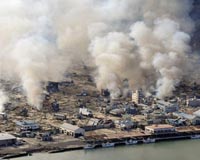 |
Tokyo (AFP) March 24, 2011 The immense and usually bustling entryway of the luxurious Imperial Hotel in the heart of Tokyo is now dimly lit and nearly empty, save for 15 staff waiting to greet guests who are unlikely to arrive. Tokyo's hotels have emptied since Japan's quake-tsunami disaster, with some forced to shut down as foreigners flee, locals stay home and businesses scrap meetings and conferences under the shadow of an uncertain nuclear threat. "Since March 11, everything has changed: seminars, banquets and reservations have been cancelled en masse, especially bookings by foreigners," Uko Komatsuzaki, head of public relations for the Imperial Hotel, told AFP. "We are usually 80 percent booked at this time of year but right now our occupancy rate is about half that," he said. "Foreigners are afraid of radioactive fallout; for the Japanese, at least at first, they were afraid of aftershocks, problems travelling to Tokyo and family fears." The nuclear emergency at the Fukushima power station, 250 kilometres (155 miles) northeast of Tokyo, and the discovery of radioactive particles in the city's tap water have spooked foreign travellers. The disaster struck weeks before Japan's famed cherry blossom season, usually a tourist draw for those looking to savour a party atmosphere under the pink billows of flowering trees in parks and world heritage sites. As for local guests, the quake and tsunami -- which have left more than 25,000 dead or missing -- have erased any thoughts of merry-making. Tokyo's famed neon has been reduced to an eerie gloom amid power rationing. Weddings are going ahead on schedule due to the months of planning, but the number of attendees is greatly reduced, as some cannot travel and others are themselves survivors of the massive wall of water that hit the northeast coast. The Shangri-La Hotel, in the capital's Marunouchi business district, has shut its doors until April 16 and put its 300 staff on paid leave. "We felt that with the logistical difficulties, transportation issues and the rolling blackouts, we were not able to offer our usual standard of service," spokeswoman Maria Kuhn told AFP. Others like the Grand Hyatt and Park Hyatt in hip city districts, the New Otani near the government quarter, the Mandarin Oriental or the ever-chic Peninsula have also shut down restaurants and bars, or cut back their hours. The hotels are obliged to cut back on their power consumption, and suffer the indirect effects of the rolling blackouts instituted by embattled Tokyo Electric Power Co., the operator of the Fukushima plant. Those hotels with a primarily foreign clientele are suffering the most, as Europeans and Americans were the quickest to leave Tokyo in the aftermath of the March 11 disaster and have yet to come back, travel agents say. "2011 was shaping up to be a brilliant year, an exceptional one with the number of individual tourists sharply up -- we've never seen such a tourist love affair as we've seen in recent months," said Claude Sauliere, the manager of French agency Vivre le Japon. "The backlash is awful -- I think that 90 percent of the people who were planning to come to Japan this spring will cancel," added the industry veteran, who predicted that cancellations could continue to flow in all year. The Imperial Hotel's Komatsuzaki shares Sauliere's concerns. "We fear that foreign tourists won't come back any time soon, especially if the radioactive contamination of foodstuffs gets any worse," he said. "To try to make up for the shortfall, we're planning on making special offers to Japanese customers, including those who live close to Tokyo."
Share This Article With Planet Earth
Related Links Bringing Order To A World Of Disasters A world of storm and tempest When the Earth Quakes
 Japan rebuild may hit $309bn, radiation fears grow
Japan rebuild may hit $309bn, radiation fears growOsaka (AFP) March 23, 2011 Japan on Wednesday said the cost of rebuilding the country after its biggest recorded earthquake could be as much as 25 trillion yen ($309 billion) as a deepening radiation scare hit shares. In the biggest estimate so far, Japan put the cost of the earthquake-tsunami disaster at more than twice that inflicted by the 1995 Kobe quake. The World Bank has said Japan needs up to five years to reb ... read more |
|
| The content herein, unless otherwise known to be public domain, are Copyright 1995-2010 - SpaceDaily. AFP and UPI Wire Stories are copyright Agence France-Presse and United Press International. ESA Portal Reports are copyright European Space Agency. All NASA sourced material is public domain. Additional copyrights may apply in whole or part to other bona fide parties. Advertising does not imply endorsement,agreement or approval of any opinions, statements or information provided by SpaceDaily on any Web page published or hosted by SpaceDaily. Privacy Statement |